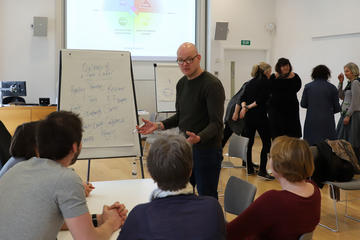I was delighted to host an OCL alumni event recently at the Design Museum, and it happened to fall exactly 6 months after I had attended the course in March 2018. Preparing to welcome around 15 previous delegates and faculty members on 21 September gave me an excellent opportunity to reflect on life since OCL and appreciate how my approach to leadership has been influenced by the experience, advice and revelations of the course; I feel mostly naturally and unconsciously, rather than in a planned or artificial way.

Paul Gibbons, Head of Visitor Experience at the Design Museum, on Oxford Cultural Leaders 2018
My OCL journey has really all been about timing, that 6-month anniversary reminded me of the crossroads I was at when I submitted my application to join the course in autumn 2017.
As Head of Visitor Experience at the Design Museum, I had helped lead the organisation through a challenging and exciting 3 year £82m capital project to move across London into a brand new museum building with three times the space, staff, visitor numbers and income targets, but remaining largely self-funded.
Since opening the new museum in November 2016 most of the museum’s leadership team had naturally been focussed on operational delivery and tackling the myriad practical issues, both known and unexpected, which are a central feature of any large new building project. As our first birthday approached we were conscious of the need to change gear, finally rise above the day-to-day and return to the strategic planning and leadership which any organisation needs from its senior management team.
Approaching this turning point is exactly why OCL appealed to me so much.
My career has been focussed on managing large teams of front-line staff and volunteers in delivering great customer service, engagement and sales, so naturally I am very familiar with the literal meaning of being a leader - being visible, in command, communicating, giving instructions, motivating and measuring performance. My preparation for, experience during, and working life since OCL has helped me to see how my role can be more than a head of my team and how I can become an influential and adaptive leader working interdependently with my peers and senior colleagues.
In putting together the informal presentation I gave to the alumni on 21 September, it became very clear how OCL has influenced me in three ways:
- Encouraging personal reflection on my working style, my values, why I do my job and asking myself the most challenging question: ‘am I right for my organisation?’ (a question posed by Diane Lees during one of her mentoring sessions with me)
- Translating the leadership principles which resonated most significantly with me (ripple intelligence, gaining the ‘balcony view’ and harnessing the power of doubt) into practical, on-the-job tools for refreshing my working relationships, tackling contentious issues and helping re-mobilize our strategic planning.
- Becoming less of a ‘doing’ leader and more of a ‘thinking’ leader. Several of my team have noted a change in my style from being instructional to more provocational, and encouraging more independence. Similarly working with my fellow Heads of Department and the Directors, I have consciously taken a more adaptive style - emphasising the connections and relationships rather than presenting my own concerns and priorities.
Another piece of appropriate timing was that all this post-OCL influence culminated in my developing and facilitating a leadership away day on 20 September, just the day before the OCL alumni event - this impelled me to become a true adaptive leader and encourage colleagues to think about their own leadership values and styles, and of course consider applying for the course next year!
I have made valuable personal and professional connections through OCL, I jumped at the chance of returning to Oxford in the summer to help Rachel Davis and team in recruiting a new Head of Visitor Experience for the Ashmolean Museum, and I intend to keep in touch as much as possible through the great alumni networking events.